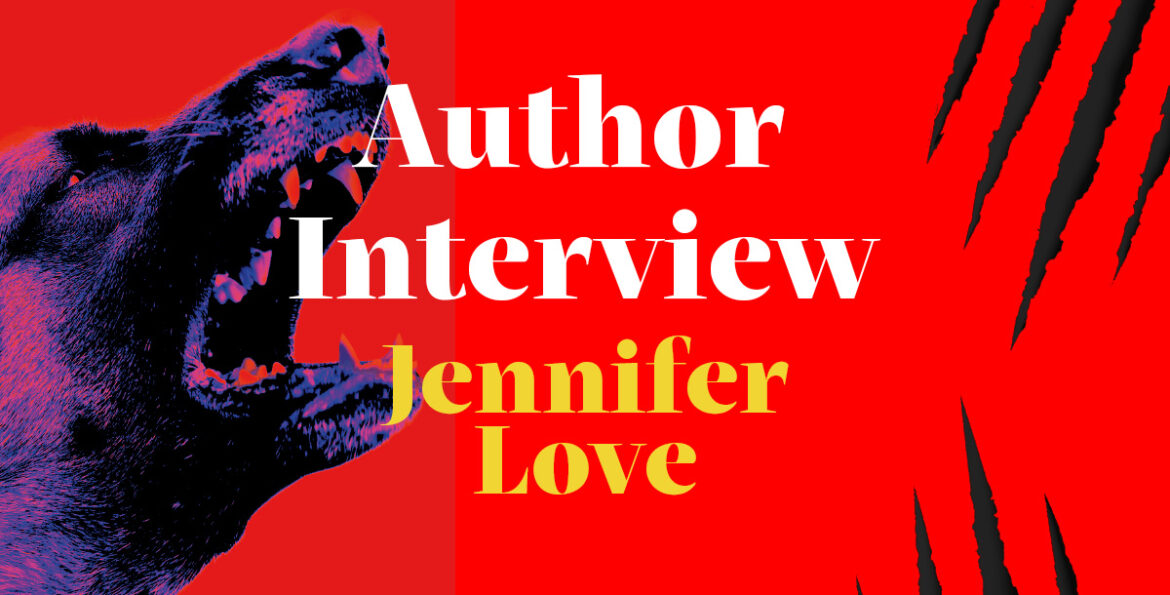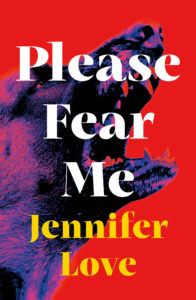

Interview with Jennifer Love Plus an Exclusive Extract
- 11th September 2024
- Category : Author,Blog,Interviews & Blogs
Please Fear Me is Jennifer Love‘s debut novel. Set throughout the US, we follow Smidge and Violet in their search for autonomy and meaning as they run away from their past traumas. Read on to learn about the creation of Please Fear Me and Jennifer’s methods in writing plus a small excerpt!
When did you first decide you wanted to be a writer?
I actually cannot remember when this wasn’t my life’s ambition. I was a voracious reader as a child and had no concept of the hierarchy of career paths, so it was just a no-brainer back then that my purpose was to write books. The first “book” I can remember writing when I was maybe eight was about a kid who has to schlep through a vaguely psychedelic jungle to rescue her parents, which is perhaps some sort of energetic precursor to Please Fear Me.
Do you have any habits or rituals you use when writing?
I tend to find myself in very noisy situations when sitting down to write – for example, I am currently writing these responses to a soundtrack of the highway, concrete drilling, and full blast cumbia music from my neighbour’s yard. I wrote Please Fear Me largely in my room at a chaotic 16-person co-op where I shared a wall with a musician and was adjacent to the backyard where the parties happened. (I wouldn’t trade this setting for the world.)
What this pattern in my life has meant is that I am constantly listening to white noise layered with videos titled things like “Royal Library Rain and Thunderstorm Sounds on Study Ambience with Crackling Fireplace” at full volume while I’m writing, and now my brain is conditioned to get in the groove when I have this blasting in my ears. My headphones are torn on both sides, foam popping out, and held together on one side with a hair tie, but they’re hanging in there and still very much an important tool in my writing arsenal.
Who are some authors that have inspired you?
Lindsay Hunter, Ottessa Moshfegh, Jenny Zhang, Kelly Link, Aimee Bender, Mona Awad, Elle Nash, Sayaka Murata, Mieko Kawakami, Katya Apekina, Virginia Woolf, Sylvia Plath, Toni Morrison, and Patti Smith amongst so many others.
What do you hope people take away from reading your book?
I hope that my general thesis in life is the takeaway, which is that teenage girls are always the most interesting people in the room.
What’s a piece of advice you can give to aspiring authors?
I don’t know if I’m in too much of a position to give advice, but I can say that my whole writing journey can be boiled down to me trying to entertain myself. Realizing that helped me show up for the book every day – writing is a voluntary activity, and I choose to do it because it’s fun! If I ever found myself writing something that I was bored by, or not writing because I was dreading writing it, I took that as a cue to reconsider whether it belonged in the story.
This is your first full length novel but you’ve written quite a few short stories and a short story collection. How has this writing experience differed from your other works?
My short stories are much more experimental, as the form itself lends the cohesiveness that we’re looking for in a story (you can read a short story in a sitting!). In some sense, I feel more confident to take big risks in short fiction because if one’s a flop, a reader can move onto the next. If Please Fear Me is a flop for someone, yikes! I’ve wasted a lot of their time!
In writing a novel, I also had to put a lot more work into deciding how much information to dole out over time. There were so many more layers to work with that you just can’t fit into a short story, so I was taping physical papers on my wall to represent chapters and characters, making notes until I ran out of space, crossing things out, and rearranging like a serial killer or a conspiracy theorist or, I suppose, a novelist.
Why did you decide to set the novel within a travelling circus?
It’s a concept that has captured my imagination for a long time, as it has done for many others, and I’ve thought a lot about what kinds of people go beyond imagining to actually join and participate in this mystique of a lifestyle.
When I was pulling together the original idea for this novel, I had the notion that my protagonist needed to end up in some sort of insular setting that would prevent her from just going straight home as soon as she feels the compulsion to. A travelling circus was a setting that provided this insularity, kept her moving in line with her on-the-run lifestyle, and seemed a natural choice for two performance artists to boot.
Trans (and other LGBT+ identifying) characters are present throughout Please Fear Me in a realistic way. How did you decide to portray these characters and do you have any tips for other authors wanting to incorporate LGBT+ characters in their writing?
Queer people tend to find each other wherever we go, so I’ve always gravitated towards other queer people in my life. With this being the case, it felt natural for my queer protagonist to run into and form connections with people who she could relate to on this level – even when her own queerness is not necessarily something that she actively thinks about very much. I aimed to treat the other queer characters with that same grace. Their identities did not need to be central to their storylines and motivations, nor dwelled upon, nor even explicitly disclosed, but deserved to exist on the page and inform the way that they related to each other.
For other authors, my best tip is probably simply to read Idlewild by James Frankie Thomas.
What was the most difficult part in writing Please Fear Me?
I was drawing from some emotionally difficult places while writing some scenes, which could of course be draining, but also frustrating when it didn’t feel like I was able to translate a complex emotion accurately. Part of my motivation for writing this story was to honour the rich interiority of the maladjusted teenage girl, whose external behaviours are so often and so easily dismissed by greater society… so getting this right felt quite important.
It was also challenging to try to render a lot of chaos, both internal and external, without the story getting lost in the sauce. I wanted it to somewhat read like the scribbling of a teenage girl’s diary, so left a lot of emotions raw, and a lot of decisions and reactions hasty. The revision process involved a lot of deciding where to maintain that angsty chaotic energy and stay true to the book’s original spark of inspiration, and where to smooth it over into something more accessible and readable.
Do you have a favourite character?
I don’t think I do!
If you joined a circus what would your role be?
Aspirationally, a flying trapezist. Realistically, a clown.
Why did you name the circus Holy Toledo?
“Holy Toledo!” is a cute exclamation that one might make in reaction to the show, and the inclusion of the word “holy” is a nod to the belief system that underpins it.
So much of this novel is centred on relationships and reliance between young girls. What made you want this to be the main focus?
The relationships I’ve made with other girls and women have been central to my life: can’t even imagine what it would have been like to not have my sister from the start, and structure my current life around tending to each of my precious friendships like veggies in a beautiful garden.
Two girls who love each other create a truly unstoppable force of nature, however it looks from the outside. These relationships are a means to build a secret, untouchable world that exists outside of where the usual power structures have influence. That’s the closest thing to magic we have in real life.
If you could say anything to Smidge, what would it be?
I would show her the Hang in There! cat poster, read her Wild Geese by Mary Oliver, and play her the Live Through This album in full.
If you could describe Please Fear Me in one word, what would it be?
Harum-scarum.
Read on for a small excerpt of Please Fear Me…
*
Violet treats everything like a threat. She opens both doors to walk into the audition room, green-lidded eyes scanning and darting to every corner, one-two-three-four.
Auditions are easy to get, which I suspect has something to do with the perverse satisfaction of watching other people fail. They’re easy to get, and hard to believe in after a while. Violet has dragged me all over the coast to auditions in theaters, dive bars, performing arts collectives and a converted school bus whose owner told us he was cooking up the next big thing, the next great big American traveling showcase with pirates and cowboys and pixies.
Even he didn’t want what we had to offer.
Violet stands before the three men sitting behind a fold-up table. There is absolutely nothing on the table.
‘My name is Violet Laborde, and this is Smidge. We are living dolls.’
We always perform without music, because neither of us wants to put a target on our backs by carrying around a jukebox, and you never know if these places will provide one.
Violet says it improves focus and coordination to perform without music, anyway. That it adds drama and suspense for the spectator.
I volunteered to be the tied-up one for our new performance. Violet has become adept at the crosses and knots of wrapping my body in a secure network of rope, quickly enough to get the show on the road, and with enough flourish to draw admiration and intrigue before we have even begun.
When she first recruited me, I asked what it meant, which proved to be the wrong question.
‘It’s performance art,’ she had scowled. She’d been filing her newly applied plastic fingernails into sharp little claws.
‘But what does it mean?’ I had persisted. In my head I was thinking, but what is the point. I would never say that out loud, though.
‘It’s about fragility. It’s about being bound.’
‘Bound to what?’
‘Bound to rules that someone else made up for you, some people you don’t even know, and they’re probably all dead by now, and yet here we all are, still listening to them. No one thinks about that, Smidge. They’ve only come up with the words so far for bullshit like religion and free will. And they don’t think about it because they don’t have to think about it, and I want to make them. But I don’t want to burn shit down to get people’s attention, you know? I want to make it beautiful.’
Sometimes I just let Violet keep talking, even if I don’t follow. Somehow I always understand the feeling behind what she’s saying, even if the words don’t make sense to me.
‘And tragic.’
‘What?’
‘Beautiful and tragic. Like Shakespeare.’
*
Please Fear Me is publishing on 5 September 2024. Order now from Blackwell’s, Bookshop.org or Waterstones.















